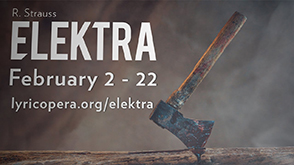
 Highly Recommended ***** Although the story is from ancient Greece, Richard Strauss’s mad Elektra could have only come at the turn of the last century. Famously rejecting the verisimilitude that was predominant in opera at the time, Strauss took the audience inside the mind of his vengeful, deranged protagonist. It is a place filled with symbols, shadows, and apparitions too dreadful for the waking world. Sir David McVicar, whose similarly sinister production of Il trovatore played at the Lyric earlier this season, has created a Freudian hellscape this time more in keeping with the dissonant music. Making her Lyric debut in the title role is the unforgettably haunting Nina Stemme.
Highly Recommended ***** Although the story is from ancient Greece, Richard Strauss’s mad Elektra could have only come at the turn of the last century. Famously rejecting the verisimilitude that was predominant in opera at the time, Strauss took the audience inside the mind of his vengeful, deranged protagonist. It is a place filled with symbols, shadows, and apparitions too dreadful for the waking world. Sir David McVicar, whose similarly sinister production of Il trovatore played at the Lyric earlier this season, has created a Freudian hellscape this time more in keeping with the dissonant music. Making her Lyric debut in the title role is the unforgettably haunting Nina Stemme.
The usurping queen Klytämnestra (Michaela Martens) has ruled now for seven years after slaying her husband, Agamemnon, and it has clearly not gone well. Like Scotland under Macbeth, nature is in rebellion, and paranoia and brutality have set in among the populace. At rise, a group of women labor under the overseer’s whip and mock Elektra for continuing to wish daily that her brother, Orest (Iain Paterson) will return and slay their mother and her new husband, the vile Aegisth (Robert Brubaker). Klytämnestra suspects something is in store for her, too, and is determined to slaughter until she has expurgated her indescribably ghastly dreams with bloody sacrifices.
Stemme grabs the audience’s attention immediately. It’s no slight to her voice to say she looks like something out of a silent movie. Her gestures and wild expressions are as bold as her singing; there’s a rule there, but not the rule of naturalism or artificial beauty. It would be hard to play Elektra any other way. The book is from a psychanalysis-informed German-language play by Hugo von Hofmannsthal, but Strauss was clearly still being affected by his earlier work, an adaptation of Oscar Wilde’s decadent masterpiece Salome. Elektra’s language is putrid and her hate even for the palace’s animals is what Wilde would approvingly call “too much.” She’s definitely her mother’s daughter; even more vocally dissonant and visually audacious is mezzo Michaela Martens as the queen. Bald, wrapped in metal, and with fierce make-up, she looks unfathomably archaic and terrifying. She leans into the hisses of the German consonants, sometimes a whispering beast, sometimes hovering like a manifestation of the miasma she describes.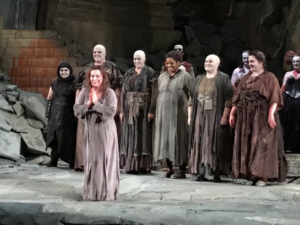
Elektra was one of the first modern operas and it liberally uses atonality, but there are a lot of leitmotifs mixed in. Also debuting at the Lyric is conductor Donald Runnicles, who is well versed in the ebbs and flows of volume this music requires. Though it’s intense throughout its short running time, it has some melodic moments. Eliza van den Heever plays Elektra’s sister Chrysothemis, a gentler woman who tries with her measured vibrato to inject some reason into the world. Her duet with Elektra is the play’s only moment of sweetness and is just as dynamic as the ruminations on revenge. Paterson, as the wandering Orest, is a dignified, mysterious figure of dread. (It’s unsurprising that he recently played Wotan elsewhere.) His voice is aristocratic, complementing the subterranean pitch of his leitmotif. And then there’s Brubaker’s brief, but scene-stealing bout as loutish Aegisth. He sets a new standard for cruel foppery.
For this revival production, the Lyric has tapped Remy Bumppo artistic director Nick Sandys. Although Sandys has mostly served the Lyric as a fight choreographer, Remy Bumppo frequently mines the expressionistic literature of Strauss’s era, and McVicar’s vision is in good hands. John MacFarlane designed the dystopian circus sets and costumes, and they do seem like a vortex that will suck the viewer into a world where torch-bearing murderers are monstrous in form as well as spirit. Elektra is emotionally charged, but the titular character is trapped and unable to act. She and the audience experience a parade of strange happenings, and if the audience wants to be immersed in surrealist sounds and visions, it doesn’t get better than this.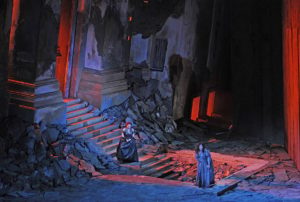
Elektra will continue at the Civic Opera House, 20 N Upper Wacker Drive, Chicago, thru February 22, with the following showtimes:
February 6: 2:00 pm
February 10: 2:00 pm
February 14: 7:00 pm
February 18: 7:00 pm
February 22: 7:00 pm
Running time is one hundred minutes with no intermission.
The Lyric offers parking deals with Poetry Garage at 201 W Madison St. if inquired about in advance. Tickets start at $37; to order, visit LyricOpera.org or call 321-827-5600.
To see what others are saying, visit www.theatreinchicago.com, go to Review Round-Up and click at “Elektra.”


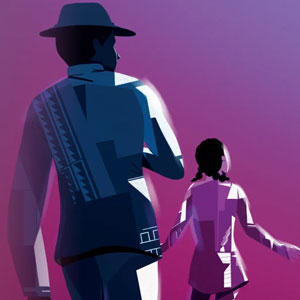
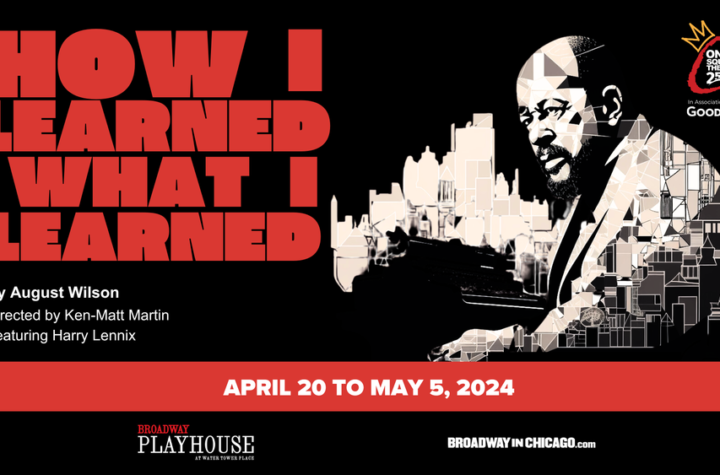


More Stories
“Joe Turner’s Come and Gone”
“How I Learned What I Learned” reviewed by Julia W. Rath
“How to Know the Wild Flowers: A Map” reviewed by Julia W. Rath